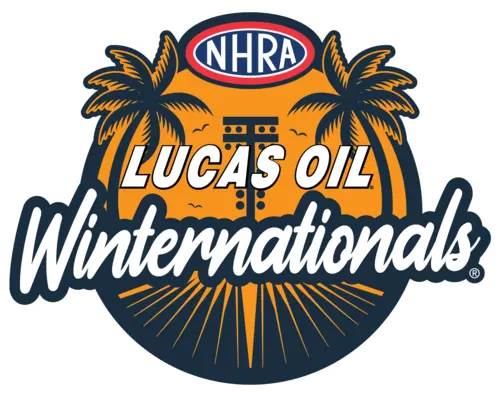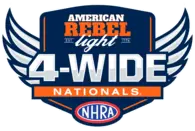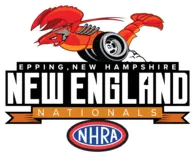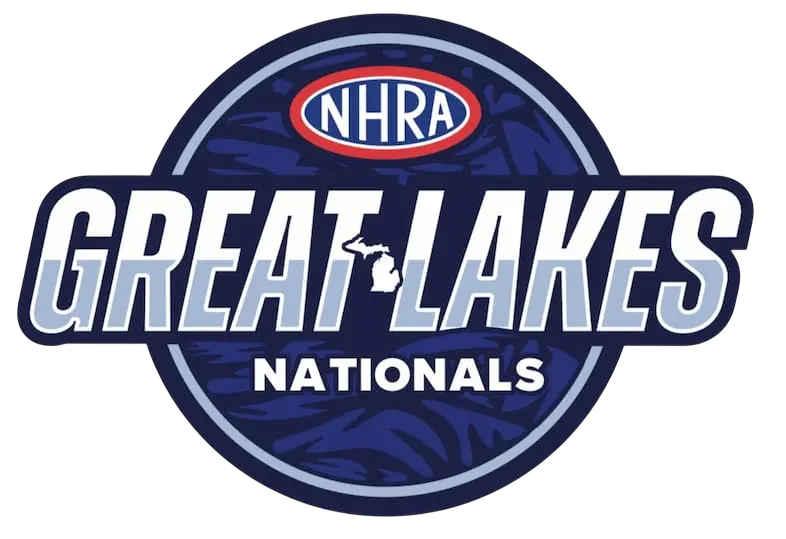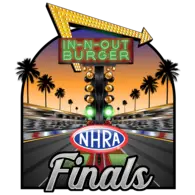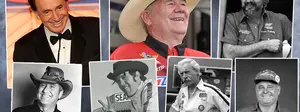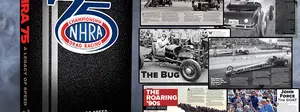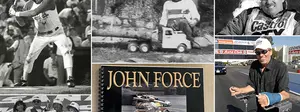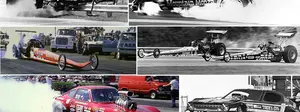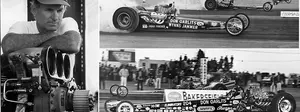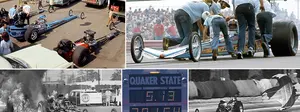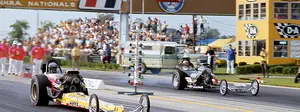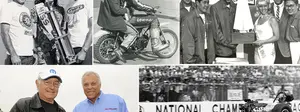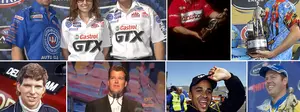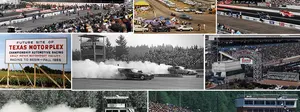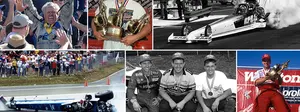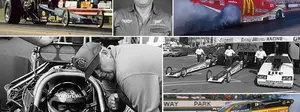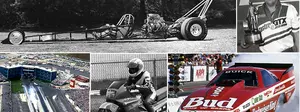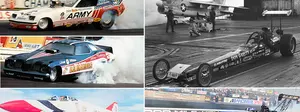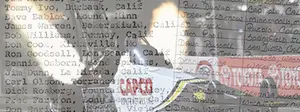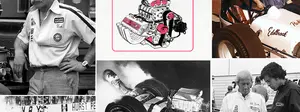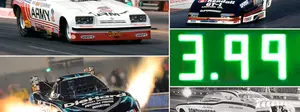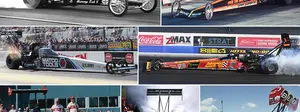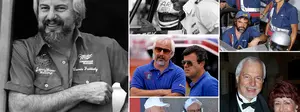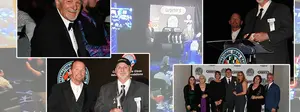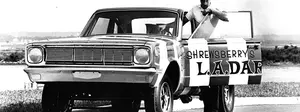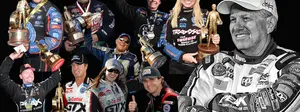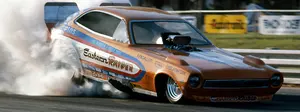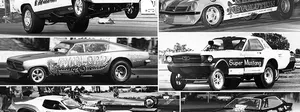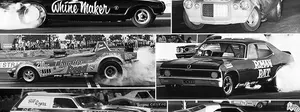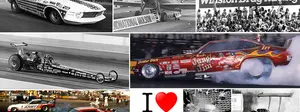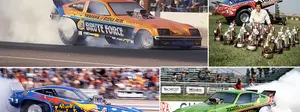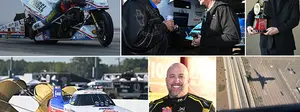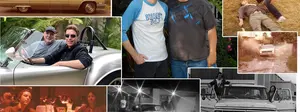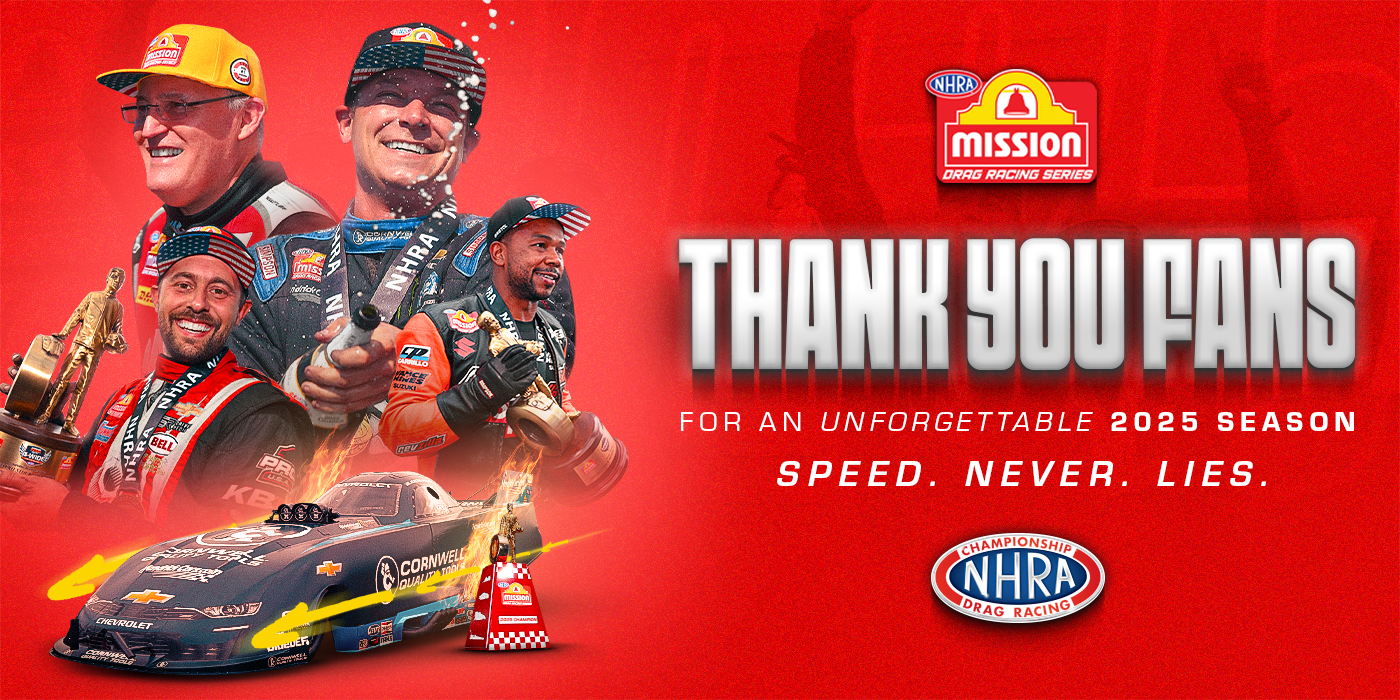

The Bobby Vodnik story, plus more Cassidy Bros.

Bobby Vodnik’s first serious ride was this B/Gas dragster that he campaigned with Larry Reimer and his uncle, Jim DeVos.
|

Vodnik at the wheel of the Speed Sport dragster in San Gabriel, Calif.
|
Although Bobby Vodnik’s lasting legacy will always include his ’63 Indy win in the Hirata & Hobbs car, in which he upset highly favored Don Garlits in the final round, he certainly had a memorable career before and after that, including time under the mentorship of legendary “Golden Greek,” fellow Chicagoan Chris Karamesines.
Vodnik began his racing career with a 354 Hemi-powered B/Gas dragster with Larry Reimer and his uncle, Jim Devos, and made the move to Top Fuel in 1960 when Joe Bush, of Speed Sport Automotive fame, offered the blown fuel Chrysler he had been supplying to a former partner’s Fuel Coupe. Vodnik and Reimer had been splitting wheel time, but it was decided that Vodnik, who was still in high school and trying to fit studies between his racing, would be the driver of the new entry.
The team ran together through the middle of the 1962 season, including a trip west to the March Meet as part of an event in Oswego, Ill., where 20 cars from the Midwest received money to help with expenses for the trip to the West Coast. Although they lost in round one due to a broken blower-drive chain, the following weekend they won Top Eliminator in Tucson, Ariz., beating the Speed Sport team’s dragster in the final. Later that year, Lyle Fisher brought both the Speed Sport roadster and the Speed Sport dragster to Chicago and offered Vodnik the seat in the dragster, and Vodnik moved his base to Tucson.
During the holiday season of 1962, Vodnik ran out of funds and hitched a ride home with “the Greek” and ace wrench Don Maynard, driving through a raging snowstorm from Kansas City, Mo., back to Chicago. When they got there, there was a foot and a half of snow on the ground, and suddenly warm Tucson looked pretty good. Vodnik wrangled a ride in Gene Lang’s dragster for the 1963 AHRA Winternationals in Phoenix and rode back down south with Karamesines to run a few match races and then to pick up his new car from Rod Stuckey and prepare it to race in Phoenix. Maynard would follow a few weeks later, riding with Hirata and Hobbs, who also were going to compete at the event.
Karamesines and his young helper ran a few dates out west then headed for Phoenix to meet up with Maynard, but tragedy struck on a remote stretch of Route 66 outside of Amarillo, Texas, when their station wagon, driven by Maynard, collided head-on with that of an elderly couple who had lost control of their vehicle. Maynard and the couple all died in the accident, and both Hirata and Hobbs, who also were riding in the front seat, were seriously injured. Hirata suffered facial injuries and Hobbs a broken back, according to Vodnik.
A grieving Karamesines turned the car over to Stuckey to drive, and he set low e.t. at 7.81 and top speed of the meet at a mind-boggling 214 mph; the next-best run that year was 208 mph.

Vodnik drove for the legendary Chris Karamesines’ Chizler for a short time. Chassis builder Rod Stuckey is pictured center.
|

In early 1963, Vodnik began a long association with Dick Belfatti, driving his Shadow Top Fueler.
|
“Watching Rod make that one run taught me a lot about driving,” recalled Vodnik. “He was a clutch slider. He slipped the clutch perfectly, didn’t boil the tires, just smoked them lightly, and the car really hauled. Stuckey had already promised his wife he would never drive again, so he didn’t even show up to run eliminations, and we were disqualified.”
Karamesines also tried to book his car with Vodnik driving but found few takers for the car with “a nobody kid” (in Vodnik’s words) driving — one of the big exceptions being Vodnik sitting in for Karamesines (and winning) a Drag News Top-Ten List challenge in Alton, Ill. — but did introduce Vodnik to Dick Belfatti and to Hirata, both of whom he drove for that year and would have a great impact on Vodnik’s career.
After Hirata had repaired their dragster, which had been heavily damaged in the towing accident, neither he nor Hobbs were up to driving, but they remembered Vodnik. ”I thought the kid was a pretty good driver,” said Hirata. “I gave him a call and asked him if he wanted to drive the car. He said, ‘Oh, yeah!’ “
Vodnik drove for both Belfatti and Hirata & Hobbs that summer and, at one race over the July 4th weekend, drove both cars at U.S. 30, all of which led up to Vodnik’s memorable weekend at the 1963 Nationals, the first race to feature the use of the Christmas Tree. Undoing past stories about the event, Vodnik says he did not have any previous experience on the Tree.
“Actually, I wasn’t even really happy that we were going to Indy,” he recalled. “Originally we were going to an AHRA event in Texas, where the purse was better, and because I got 50 percent of everything we made, that’s where I wanted to go. When we got in the car, they told me they had changed their minds, and we were going to Indy instead. There was no money there; you know what I got for winning Indy? $50 from Hirata, $200 from Wynn’s and a pin with two puny diamond chips, a Craftsman electric impact wrench, and a19-inch Philco portable TV. At that time, all I was interested in was money.

Vodnik in the Indy-winning Hirata & Hobbs dragster.
|

(Above) Don Garlits is out in front in the 1963 Nationals Top Eliminator final, but his lead was an ill-gotten gain after a red-light start. (Below) The happy winning team.
|
 |
“Anyway, on the way to the race, we started talking about the Tree being used there, and Hirata was telling me he’d read an article that it takes a half-second for your arm or hand to react to when you tell it to do something. Well, the lights were half a second apart, so I went up there and watched the Christmas Tree, and on every class or practice run, I’d leave on different stages of the last yellow light. I found out you can’t leave when the light is still coming on or you’ll red-light. You had to wait until the last bulb was bright yellow and just beginning to turn off. I also used yellow World War II aviation goggles that made everything brighter without glare.”
Garlits and his Swamp Rat V had won Saturday’s class title to earn the right to sit out Sunday and face the winner of a field consisting of the cars with low elapsed times set during class racing. They were Gordon Collett (8.50), Pete Robinson, (8.54), Vodnik, (8.70), John Kranenberg (8.73), Tony Nancy (8.79), Joe Schubeck (8.81), and Connie Kalitta, (8.82 seconds), and the final boiled down to Vodnik and Kalitta. After a near-even launch, Vodnik pulled ahead to win a super-tight race in which both ran 8.59.
Although he had won class, Garlits had been experiencing a mysterious vibration (that finally was traced to loose flywheel bolts) and had run a best of 8.64 and an average for six runs of 8.70. Vodnik, meanwhile, had improved from his qualifying pace to run 8.61 and a pair of 8.59s Sunday, despite nursing a wounded piston.
Vodnik also confided to me another tactic that helped him reach the final: choosing to line the car up outside what was becoming a bit of an oily groove. “Back then, every car dropped a few drops of oil, and when you have 1,000 cars down there three to six times a day, it adds up. So when I lined up, I almost had the front tire on the white line on the outside of the lane. The traction was better out there. When everyone else was spinning, I was moving when the clutch dropped.”
Vodnik admits that the team had plenty of inspiration to beat Garlits in the final, some stoked by “Big Daddy” but some external.
“Kenny [Hirata] had just gotten into a fight with Speed Sport Oil because they wanted him to pay for the oil even though we were in the final,” he remembers. “Then Garlits walks up and starts trying to get in my head, but he doesn’t realize I’m already pissed off over the oil deal. He asks me how I’m going to leave on the light. I just looked at him and said, ‘Don, first, I don’t care about winning the race; there’s no money here. No. 2, I’ve been around “the Greek” too long to let you bother me; and No. 3, when I get on the line and let the clutch out, that’s exactly when I’m going to leave.’ He just walked away. Hirata, who was working under the engine changing the oil, almost died laughing, but I was serious.”
Garlits, needing to make up about a tenth on the Tree, did what any driver would do, trying to shave the Tree as close as he could in the final but drew a red-light start. Vodnik made it official with an 8.62, 174.75-mph pass to Garlits’ invalidated 8.65, 177.26, but even Vodnik didn’t know he’d won.
“I didn’t know he red-lighted,” Vodnik admitted. “I went over and congratulated him, and he said, 'I think I red-lighted.’ It didn’t really sink in. Later on, I realized how big a deal it was. It made for good bookings.”
As to any potential hard feelings between him and Garlits over the stunning upset, Vodnik theorized, “I don’t think he hated me as much as he hated himself.”

In 1966, Vodnik drove The Guzzler Top Fueler and won the Drag News Invitational. He’s [pictured with, from left, Don Mattison, Bud Roche, Gail Czarnowski, Harold Brewer, and Fred Brewer.
|
In 1964, Hobbs returned to driving their car, and Vodnik drove the Masters & Richter car at the beginning of 1964 while Belfatti awaited delivery of a new car that was to be a clone of Karamesines' Stuckey-built car but built by Fred Allen. The new car was impressive immediately; Vodnik set the first sub-eight-second NHRA national record with a 7.96 at Cecil County in Maryland. They raced together through the end of the 1965 season, when Vodnik married his wife, Sarah. In 1966, he partnered with Don Mattison and Bud Roche on The Guzzler fueler and won the Drag News Invitational event at U.S. 30 Dragway. The birth of his daughter in August led Vodnik to take a break from racing — during which time he was replaced in The Guzzler — but he did compete at Indy in Gordon Collett’s car, with which he reached the semifinals before a warped flywheel ended his day just short of more Indy glory.
With his family responsibilities and a new job outside of racing that required six days a week, Vodnik raced only occasionally in 1967, driving Hirata’s new Hemi–powered gas dragster until that was no longer possible, and he retired from competition.
“I just couldn’t get the time off to race anymore, so I forgot about it and stayed away from it for several years because I didn’t want to get tempted to go back to driving,” he said. “A lot of guys just can’t resist.”
I appreciate the time that Vodnik spent with me on the phone as well as the use of many of the photos pictured above. He's certainly one of the many guys I've always been curious about due to his interesting place in Indy lore.

 |
The response to my column about the Cassidy brothers was impressively strong, as the brothers, unknown to some west of the Mississippi, are still fondly remembered by fans and fellow racers, who submitted some thoughts and photos, which I shared with former team member Franklin Amiano, who had a story to go with almost every one.
Bill Warburton, who raced against the Cassidys in Pro Comp with his Brewmasters A/FD, sent along the photo at right, which shows Les Cassidy defeating him in the first round at the 1974 Summernationals. “This one still hurts,” he joked. “We qualified in the top half of the field, but I ‘black tracked’ the tires all the way down the track due to the usual hot and humid weather that was always present at the Summernationals."
Remembers Amiano, “That was the race that rained during qualifying. Lester and Dale Hall were the next pair up after the rain stopped. Les went out on his burnout, slid off the track, across the wide grass apron that E-town had at the time, and tapped the guardrail with the right rear corner of the Grand Am. He drove back onto the track and backed up, expecting Buster [Couch, chief starter] to shut him off. Instead, Buster waved him in to stage, yelling ‘C'mon Lester, let's go!’ Yup! It was just another day at the office for Lester.”
Mark Platt, who began working at racetracks in Texas in the mid-1970s when he was just 13 and has met a Who’s Who of the sport over the years, got to meet the Cassidys, too.
 Chuck Muller sent me a link to some of his old Cassidy brothers photos, and I love this one, which shows just how narrow that old cattle trailer was. That license plate is also, well, um, pretty interesting ... |
“I was fortunate to meet the Cassidy Bros. in 1978 in Atlanta. I was working pit parking control that day, and the Cassidys showed up late, and there wasn't much space for them to park, but we managed to get them a spot. They were so very nice and appreciative of how we accommodated them. They made the show on their first qualifying pass with ease! You mentioned that they hauled their Funny Car in a bus; well, at this race they showed up with a trailer that, at some point in time, was a horse trailer. They had converted the trailer, and it had a roof, but the sides were open and still had the side bars like a horse trailer does. The car fit really tight and barely had enough room to squeeze by on the sides. They could only lift the body so high in order to climb into the car to unload it. Needless to say it worked and makes me remember the good old days when everyone paid for everything out of pocket.”
“There are stories behind every story when John and Les were involved,” replied Amiano. “The reason they were late getting into Atlanta was because they stopped to help Dale Pulde. Pulde had smoked the transmission out of his crew cab and was stuck a few miles from the track. So Johnny dropped the horse trailer (actually a cattle trailer), hooked up to Pulde's trailer, and towed it into the track then went back and got the cattle trailer. Johnny bought the cattle trailer from our friend in Ohio, Bob Larimore. One night, we pulled into a service area somewhere, and the pump jockey asked Lester ‘How many horses are you hauling?’ Les told him ‘On a good day, maybe 2,000,’ and walked away. I heard the guy mutter under his breath ‘They must be awful small ... ’ “
I also heard from Tim Anderson, who some of you may know as the general manager at Racepak. “The Cassidy Bros. story brought back great memories,” he wrote. “I grew up in Bristol and remember watching them numerous times. They were always one of my favorite teams as Les would jump out of the car as soon as it rolled to a stop in the pits and start thrashing without taking off his fire pants and jacket.”
I can’t mention everyone who wrote in to share their appreciation of the team’s efforts, but it’s great that even a smaller team, usually far from the national event spotlight, can be so fondly remembered by so many, and I’m glad that we all have a place like this to do it.





